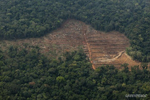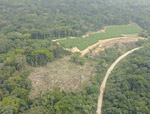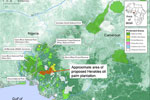
Forest and river in Herakles’ concession area. Photo: © Greenpeace/Alex Yallop.
Satellite mapping and aerial surveys have revealed that a controversial palm oil concession in Cameroon is almost entirely covered by “dense natural forest,” according to a new report by Greenpeace. The activist group alleges that the concession, owned by Herakles Farms, is under 89 percent forest cover. The U.S.-based corporation intends to build a 70,000 hectare palm oil plantation in a region surrounded by four protected areas, including Korup National Park, but has faced stiff criticism from numerous environmental groups as well as conflict with locals.
“The project would remove land and resources that are critical to the livelihoods of local communities and would disastrously impact biodiversity as well as produce millions of tons of greenhouse gas emissions,” the Greenpeace report, Herkales Farm in Cameroon: A showcase in bad palm oil production, reads.
A part of the Congo Rainforest, the extended forest in question is home to startling biodiversity, including over 600 species of trees, nearly 200 reptiles and amphibians, an estimated 1,000 butterflies, 400 species of birds, and 160 species of mammals. Fourteen species of primate are found in Korup National Park alone, including the world’s most imperiled chimpanzees: the Nigeria-Cameroon chimpanzee (Pan troglodytes ellioti).
Early on, Herakles Farms attempted to position itself as a company that was duly concerned about the environment in the region and sustainable development. In 2011, CEO Bruce Wrobel, said that the company employees consider themselves “environmentalists.”
“We believe that developing a sustainable and responsible palm oil industry in Africa is key to food security on the continent… We expect that when complete we’ll move half of families in the economic impact area into middle class,” Wrobel told mongabay.com. “We have lofty social ambitions there.”
However, since then Herakles Farms has faced considerable pushback, both locally and internationally. Last year the company abandoned seeking certification from the Roundtable on Sustainable Palm Oil (RSPO), which provides guidelines for sustainable palm oil production, after NGOs put forward specific complaints against the company’s operations.
Greenpeace says the company withdrew “as soon as its failings were exposed and before the complaints were resolved.” But Herakles Farms contends it had to jump ship on the RSPO in order to move plantings from the nursery into the field.
But it’s not just an international NGO that has voiced concerns. The concession area covers several villages and some view the plantation as “land-grabbing” of traditional lands. There have been local protests and complaints that Herakles has not been transparent about its plans. There has also been reports of human rights violations. Last November, the director of the local NGO SEFE (Struggle to Economize Future Environment), Nasako Besingi, and three other team members were arrested from the SEFE office and held without charges for several days. Besingi, who has also been assaulted for his activism, is known as among the most vocal critics of the Herakles project.
A new report by The Rainforest Foundation UK (RFUK), Seeds of Destruction, warns that what is happening in Cameroon—land conflict and deforestation due to palm oil plantations—could soon spread across the Congo Basin. The report notes that palm oil companies are kick-starting production on half a million hectares in the region, increasing the amount of palm oil plantation in the Congo Basin by a factor of five. Listing Herakles Farms as a case study, the report adds that while the company “has received generous tax breaks from the Cameroonian government,” the project remains “controversial locally, nationally and internationally, and has faced questions as to its legality.”
Herakles Farms did not respond to request for comment, but in the past has said it will not covert high conservation value forest (HCVF) and intends to meet or exceed RSPO guidelines regardless. The company argues the project will bring jobs and other livelihoods to a largely-impoverished region.

Oil palm nursery in a Herakles Farm’s concession area. Last year Herakles Farms said it had permission to set up three nurseries covering 100 hectares even before producing a Social and Environmental Impact Assessment (SEIA). Photo: © Greenpeace/Alex Yallop.

Rainforest in the concession area. In the past, Herakles stated it would not clear High Conservation Value Forest (HCVF). Photo: © Greenpeace/Alex Yallop.

Construction equipment in forest cleared by Herakles Farms. Photo: © Greenpeace/Alex Yallop.
Related articles
Photos reveal destruction of Cameroon rainforest for palm oil

(11/26/2012) Newly released photos by Greenpeace show the dramatic destruction of tropical forest in Cameroon for an oil palm plantation operated by SG Sustainable Oils Cameroon (SGSOC), a subsidiary of the U.S. company Herakles Farm. The agriculture company is planning to convert 73,000 hectares to palm oil plantations on the edge of several protected areas, but has faced considerable opposition from environmentalists and some local communities. In addition to the aerial photos, Greenpeace alleges that ongoing forest clearing by Herakles is illegal since the companies 99-year lease has yet to be fully approved by the Cameroonian government.
Activists protesting controversial Cameroon palm plantation arrested
(11/17/2012) Activists protesting conversion of rainforest to an oil palm plantation have been arrested in Cameroon, reports Greenpeace.
Palm oil company in Cameroon drops bid for eco-certification of controversial plantation
(09/05/2012) Herakles Farm, a U.S.-based agricultural developer, will no longer seek eco-certification of its 70,000-hectare oil palm plantation in Cameroon, reports the Roundtable on Sustainable Palm Oil (RSPO). The move comes amid criticism from environmental groups that Herakles is converting high conservation value rainforest for the plantation.
Scientists say massive palm oil plantation will “cut the heart out” of Cameroon’s rainforest

(03/15/2012) Eleven top scientists have slammed a proposed palm oil plantation in a Cameroonian rainforest surrounded by five protected areas. In an open letter, the researchers allege that Herakles Farm, which proposes the 70,000 hectare plantation in southwest Cameroon, has misled the government about the state of the forest to be cleared and has violated rules set by the Roundtable on Sustainable Palm Oil (RSPO), of which it’s a member. The scientists, many of whom are considered leaders in their field, argue that the plantation will destroy rich forests, imperil endangered species, and sow conflict with local people.
Palm oil, poverty, and conservation collide in Cameroon

(09/13/2011) Industrial palm oil production is coming to Africa, its ancestral home. And like other places where expansion has occurred rapidly, the crop is spurring hope for economic development while generating controversy over its potential impacts. The world’s most productive oil seed has been a boon to southeast Asian economies, but the looming arrival of industrial plantations in Africa is raising fears that some of the same detriments that have plagued leading producers Malaysia and Indonesia—deforestation, greenhouse gas emissions, biodiversity loss, conflicts with local people, social displacement, and poor working conditions—could befall one of the world’s most destitute regions. While there is no question that oil palm is a highly lucrative crop that can contribute to economic development, there is also little doubt that conversion of native forests for plantations exacts a heavy toll on the environment. The apparent conflict seems to pit agroindustrial goliaths against greens, with communities falling somewhere in between. But Herakles, a New York-based investment firm planning to construct a 60,000-hectare plantation in the Central African country of Cameroon, says its approach will bridge this gap between economic development and the environment. Social and environmental campaigners are skeptical.